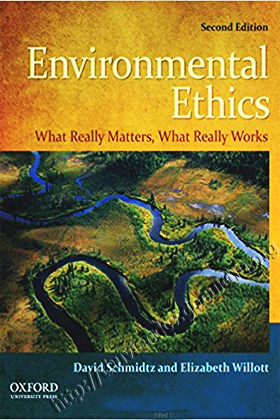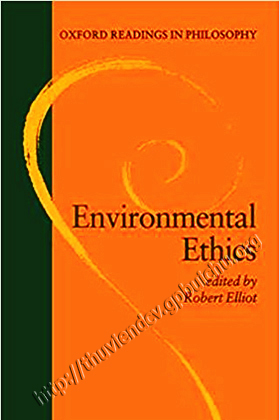
| Environmental Ethics | |
| Phụ đề: | What Really Matters, What Really Works |
| Tác giả: | David Schmidtz, Elizabeth Willott |
| Ký hiệu tác giả: |
SC-D |
| DDC: | 179.1 - Tôn trọng cuộc sống và thiên nhiên |
| Ngôn ngữ: | Anh |
| Số cuốn: | 1 |
Hiện trạng các bản sách
|
||||||||||||||||
» Thêm vào danh sách tác phẩm yêu thích
| Acknowledgments | ix |
| Eỉizabeth Wỉlỉott and David Schmidti, Why Environmental Ethics? | xi |
| I. VVHAT REALLY MATTERS? ESSAYS ON VALUE IN NATURE | |
| 1. The Dawn of Reverence | 3 |
| Questions for Reílection and Discussion: A Fierce Green Fire | 3 |
| Gregg Easterbrook, A Moment on the Earth | 4 |
| Aldo Leopoỉd, Thinking Like a Mountain | 6 |
| Lynn Whừe, Jr., The Historical Roots of Our Ecological Crisis | 7 |
| 2. Animal Liberation and the Land Ethic | 15 |
| Questions for Reílection and Discussion: Practical Ethics | 15 |
| Peter Singer, All Animals Are Equal | 17 |
| Aldo Leopold, The Land Ethic | 27 |
| Hoỉmes Rolston IIỈ, Values in and Duties to the Natural World | 33 |
| Mark Sagojf, Animal Liberation and Environmental Ethics: | |
| Bad Maưiage, Quick Divorce | 38 |
| 3.Extending the Realm of Rights | 45 |
| Questions for ReAection and Discussion: Natural Rights | 45 |
| Christopher D. Stone, Should Trees Have Standing? Toward Legal Rights for Natural Objects | 46 |
| Joeỉ Peinberg, The Rights of Animals | 50 |
| Robin Atttìeld, The Good of Trees | 58 |
| Mary Midgley, Duties Concerning Islands | 71 |
| 4. Species Equaliíy and Respect for Nature | 82 |
| Questions for ReAection and Discussion: Where Do We Draw the Line? | 82 |
| Paul w. Taylor, The Ethics of Respect for Nature | 83 |
| David Schmiảti, Are Aỉl Species Equal? | 96 |
| 5. Environmental Holism | 104 |
| Questions for Reílection and Discussion: Keeping Our Hands Clean | 104 |
| Tom Regan, How to Worry About Endangered Species | 105 |
| Gary Varner, Biocentric Individualism | 108 |
| Bill Devall and George Sessions, Deep Ecoỉogy | 120 |
| Murray Bookchin, Social Ecology Versus Deep Ecology | 126 |
| Lilly-Marỉene Russow, Why Do Species Matter? | 137 |
| Elliott Sober, Philosophical Problems for Environmentalism | 145 |
| 6 .How VVild Does Nature Have to Be? | 158 |
| Questions for Reílection and Discussion: An Allegory | 158 |
| Martin H. Krieger, What’s Wrong with Plastic Trees? | 159 |
| Eric Katz, The Caíl of the Wild | 172 |
| Andrew Light, Ecological Restoration and the Culture of Nature 178 | |
| 7 . Rethinking the Good Life | 188 |
| Questions for Reílection and Discussion: Voluntary Simplicity | 188 |
| Thomas E. Hill, Jr., Ideals of Human Excellence and Preserving Natural Environments | 189 |
| Lester w. Milbrath, Redeíining the Good Life in a Sustainable Society | 199 |
| Mark Sagoff, Do We Consume Too Much? | 205 |
| Freya Mathews, Letting the World Grow Old: An Ethos of Countermodemity | 221 |
| 8 Ecoíeminism in Theory and Practice | 231 |
| Questions for Reílection and Discussion: Dichotomies | 231 |
| Kristen Hessler and Elìzabeth Wiỉlott, Feminisra and Ecofeminism | 232 |
| Karen J. Warren, The Power and the Promise of Ecological Feminism | 234 |
| Gita Sen, Women, Poverty, and Population: Issues for the Concemed Environmentalist | 248 |
| V. Rukmini Rao, Women Farmers of India’s Deccan Plateau: Ecoíeminists Challenge World Elites | 255 |
| II. WHAT REALLY YVORKS? ESSAYS ON HUMAN ECOLOGY | |
| 9. Human Population | 265 |
| 10. What it Takes to Preserve Wilderness | 284 |
| 11. Sustainable Use and Institutional Structure | 330 |
| Questions for Reflection and Discussion: The Logic of the Commons | 330 |
| Garrett Hardin, The Tragedy of the Commons | 331 |
| Martin J. Bailey, Approximate Optimality of Aboriginal | |
| Property Rights | 341 |
| Carol Rose, Environmental Lessons | 348 |
| David Schmidti, The Institution of Property | 361 |
| 12. Poverty as an Environmental Problem | 373 |
| Questions for Reílection and Discussion: Zambia | 373 |
| Garrett Hardin, Living on a Liíeboat | 374 |
| Peter Singer, Famine, Affluence, and Morality | 386 |
| Henrv Shue, Global Environment and International Inequality | 394 |
| Holmes Roỉston III, Feeding People Versus Saving Nature | 404 |
| Davìd Schmidtz, Natural Enemies: An Anatomy of Environmental Conílict | 417 |
| 13. Vanishing Resources | 425 |
| Questions for Reílection and Discussion: Cities | 425 |
| Jessica Woolliams, Designing Cities as ìf They Were Ethical Choices | 426 |
| Gregg Easterbrook, Why the Good News Shouldn’t Scare You 430 Ed Regis, The Doomslayer | 434 |
| Paul Ehrlich and Anne Ehrlich, The Good News, in Perspective 443 | |
| 14. Cost-Benefit Analysis and Environmental Policy | 454 |
| Questions for Reílection and Discussion: Optimal Pollution | 454 |
| Steven Kelman, Cost-Benefit Analysis: An Ethical Critique | 455 |
| Herman B. Leonarả and Richard J. Zeckhauser, Cost-Benefit Analysis Deíended | 462 |
| Andrew Brennan, Moral Pluralism and the Environraent | 466 |
| David Schmidtz, A Place for Cost-Benefit Analysis | 479 |
| 15. Environmentalism in Practice | 493 |
| Questions for Reílection and Discussion: The Ethics of Conírontation | 493 |
| Bryan G. Norton, The Environmentalists’ Dilemma: Dollars and Sand Dollars | 494 |
| Bryan G. Norton, Fragile Freedoms | 501 |
| Eugene c. Hargrove, Therapeutic Nihilism and Environmental Management | 505 |
| Howard F. Lyman yvỉth Glen Mener, Mad Cowboy: The Cattle Rancher Who Won’t Eat Meat | 524 |
| Paul Watson, Tora! Tora! Tora! | 529 |
| Kate Rawles, The Missing Shade of Green | 535 |
| J. Baỉrd Callicott, Environmental Philosophy Is Environmental Activism: The Most Radical and Effective Kind | 546 |
| Andrew Lìght, Taking Environmental Ethics Public | 556 |





